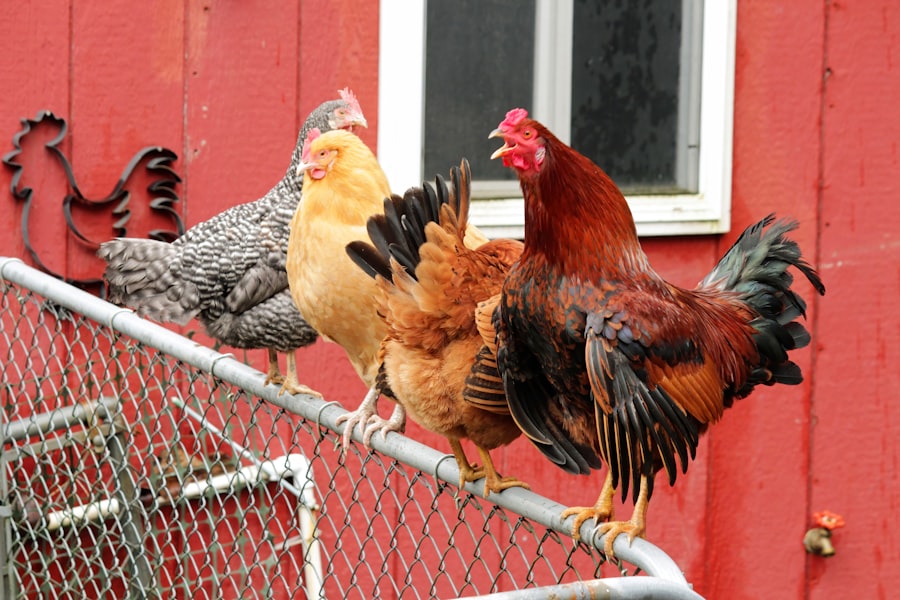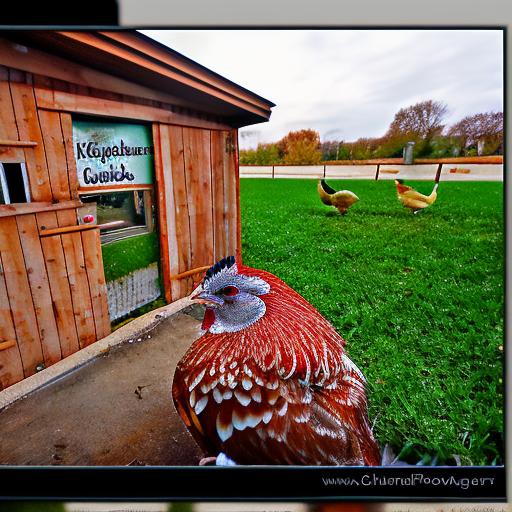Keeping chickens in your backyard has become increasingly popular in recent years, and for good reason. Not only do chickens provide fresh eggs on a daily basis, but they also offer natural pest control and can be a great source of entertainment. Whether you’re a seasoned farmer or a beginner looking to try your hand at raising chickens, there are a few key things to consider before diving in. In this article, we will explore the benefits of keeping chickens, the local regulations in Saint Charles, IL, how to choose the right breed of chickens, tips for building a chicken coop, the importance of proper ventilation and lighting, best practices for feeding and watering, maintaining cleanliness and hygiene in the coop, protecting chickens from predators and external threats, common health issues of chickens and how to address them, and finally, how to get started with keeping chickens.
Key Takeaways
- Local regulations in Saint Charles, IL allow for backyard chicken keeping with certain restrictions.
- Choosing the right breed of chickens for your backyard depends on factors such as egg production and temperament.
- Building a chicken coop requires proper planning and consideration of factors such as size and location.
- Proper ventilation and lighting are crucial for the health and well-being of your chickens.
- Maintaining cleanliness and hygiene in your chicken coop is essential for preventing disease and ensuring healthy chickens.
Local Regulations on Keeping Chickens in Saint Charles, IL
Before you start building your chicken coop and bringing home a flock of chickens, it’s important to familiarize yourself with the local regulations in your area. In Saint Charles, IL, there are specific guidelines that must be followed when keeping chickens in your backyard. According to the city’s municipal code, residents are allowed to keep up to six hens (no roosters) on properties that are at least 10,000 square feet in size. The coop must be located at least 25 feet from any neighboring dwelling and must be kept clean and odor-free. Additionally, the coop must be predator-proof and provide adequate shelter and ventilation for the chickens.
It’s important to note that regulations may vary depending on where you live. To find out the specific regulations in your area, you can contact your local city or county government office or visit their website. There are also online resources available that provide information on local regulations for keeping chickens in different areas.
Choosing the Right Breed of Chickens for Your Backyard
When it comes to choosing the right breed of chickens for your backyard, there are a few factors to consider. Different breeds have different characteristics, such as egg-laying ability, temperament, and size. Some breeds are known for their prolific egg-laying, while others are more docile and friendly. It’s important to choose a breed that suits your needs and preferences.
If you’re primarily interested in fresh eggs, breeds such as Rhode Island Reds, Leghorns, and Sussex are known for their high egg production. These breeds are also generally hardy and easy to care for. If you have children or want chickens that are friendly and easy to handle, consider breeds like Silkies or Orpingtons. These breeds are known for their docile nature and make great pets.
It’s also important to consider the size of the breed. If you have limited space in your backyard, you may want to choose smaller breeds like Bantams or Seramas. These breeds take up less space and require less food than larger breeds.
Building a Chicken Coop: Tips and Guidelines
Building a chicken coop is an essential part of keeping chickens in your backyard. The coop provides shelter and protection for the chickens, as well as a place for them to lay their eggs. When building a chicken coop, there are a few tips and guidelines to keep in mind.
Firstly, consider the size of the coop. The general rule of thumb is to allow at least 4 square feet of floor space per chicken. This will ensure that the chickens have enough room to move around comfortably. Additionally, provide at least 1 nest box per 3-4 hens for egg-laying.
When it comes to materials, choose sturdy and durable materials that can withstand the elements. Pressure-treated wood is a popular choice for the frame of the coop, as it is resistant to rot and decay. For the walls and roof, consider using plywood or metal sheets. Make sure to provide proper insulation to keep the chickens warm in the winter and cool in the summer.
Proper ventilation is crucial in a chicken coop to prevent the buildup of moisture and ammonia. Install windows or vents near the top of the coop to allow for air circulation. It’s also important to provide adequate lighting in the coop. Chickens need natural light to lay eggs, so make sure to include windows or skylights in your design.
The Importance of Proper Ventilation and Lighting in Your Chicken Coop
Proper ventilation and lighting are essential for keeping chickens healthy and comfortable in their coop. Ventilation helps to remove excess moisture, ammonia, and odors from the coop, while lighting provides natural light for the chickens.
Good ventilation is important for several reasons. Firstly, it helps to prevent the buildup of moisture in the coop, which can lead to respiratory issues and other health problems for the chickens. Proper ventilation also helps to remove ammonia fumes from the coop, which can be harmful to both the chickens and their caretakers. Additionally, good ventilation helps to regulate temperature and prevent overheating in the summer months.
To ensure proper ventilation in your chicken coop, make sure to include windows or vents near the top of the coop. These openings should be covered with wire mesh to prevent predators from entering. It’s also a good idea to install a fan or two to help circulate air in the coop.
In addition to ventilation, proper lighting is also important for chickens. Chickens need natural light to lay eggs, so it’s important to provide them with enough light in their coop. This can be achieved by including windows or skylights in your coop design. If natural light is not sufficient, you can also use artificial lighting to supplement.
Feeding and Watering Your Chickens: Best Practices

Feeding and watering your chickens properly is essential for their health and well-being. Chickens require a balanced diet that includes a combination of grains, protein, vitamins, and minerals. It’s important to provide them with a high-quality feed that meets their nutritional needs.
When it comes to feeding chickens, there are a few best practices to keep in mind. Firstly, make sure to provide them with a balanced feed that is specifically formulated for chickens. This feed should contain the right balance of protein, carbohydrates, vitamins, and minerals. You can find chicken feed at your local feed store or online.
In addition to feed, chickens also require access to fresh water at all times. Make sure to provide them with clean water in a container that is large enough for all the chickens to drink from. It’s important to clean and refill the water container regularly to prevent the buildup of bacteria.
It’s also a good idea to supplement your chickens’ diet with kitchen scraps and garden waste. Chickens are omnivores and will eat a variety of foods, including fruits, vegetables, and even meat scraps. Just make sure to avoid feeding them anything that is toxic or harmful to their health.
Maintaining Cleanliness and Hygiene in Your Chicken Coop
Maintaining cleanliness and hygiene in your chicken coop is crucial for the health and well-being of your chickens. A clean coop helps to prevent the buildup of bacteria, parasites, and diseases that can harm your flock.
To maintain cleanliness in your coop, it’s important to regularly clean out the bedding and droppings. Remove any soiled bedding and replace it with fresh bedding on a regular basis. This will help to keep the coop dry and prevent the buildup of ammonia fumes.
It’s also important to regularly clean and disinfect the coop to kill any bacteria or parasites that may be present. Use a mild detergent or disinfectant specifically formulated for use in chicken coops. Make sure to thoroughly clean all surfaces, including the walls, floors, and nest boxes.
In addition to regular cleaning, it’s also a good idea to practice good biosecurity measures to prevent the introduction of diseases into your flock. This includes quarantining new chickens before introducing them to your existing flock, and limiting contact with other poultry or wild birds.
Protecting Your Chickens from Predators and External Threats
Chickens are vulnerable to a variety of predators and external threats, so it’s important to take steps to protect them. Common predators include raccoons, foxes, coyotes, dogs, and even birds of prey. These predators can pose a serious threat to your flock if they are not properly protected.
To protect your chickens from predators, it’s important to build a secure coop and run. Make sure that the coop is made of sturdy materials that cannot be easily broken into. Install wire mesh around the coop and run to prevent predators from digging under or climbing over.
It’s also important to provide your chickens with a safe place to roost at night. Make sure that the coop has a secure door that can be locked at night to keep predators out. Additionally, consider installing motion-activated lights or alarms to deter predators.
In addition to predators, chickens are also susceptible to external threats such as extreme weather conditions and diseases. Make sure that your coop is well-insulated and provides adequate shelter from the elements. Provide your chickens with access to fresh water at all times and monitor their health regularly for any signs of illness.
Common Health Issues of Chickens and How to Address Them
Chickens can be prone to a variety of health issues, so it’s important to be aware of the common problems they may face and how to address them. Some common health issues include respiratory infections, parasites, egg-laying problems, and injuries.
Respiratory infections are a common problem in chickens and can be caused by bacteria, viruses, or fungi. Symptoms may include coughing, sneezing, nasal discharge, and difficulty breathing. If you suspect that your chickens have a respiratory infection, it’s important to isolate them from the rest of the flock and consult a veterinarian for treatment.
Parasites such as mites, lice, and worms can also be a problem in chickens. Regularly inspect your chickens for signs of parasites, such as feather loss, scaly skin, or weight loss. Treatments for parasites may include dusting the chickens with a poultry dust or administering deworming medication.
Egg-laying problems can also occur in chickens. Some common issues include soft-shelled eggs, egg binding, and prolapse. These problems can be caused by nutritional deficiencies, stress, or other underlying health issues. If you notice any abnormalities in your chickens’ egg-laying, consult a veterinarian for advice.
Injuries are another common issue in chickens. Chickens can be prone to pecking each other or injuring themselves on sharp objects in the coop. Make sure to provide plenty of space and enrichment for your chickens to prevent boredom and aggression. If you notice any injuries, clean the wound and apply an antiseptic ointment.
The Benefits of Keeping Chickens in Your Backyard and How to Get Started
Keeping chickens in your backyard can be a rewarding and enjoyable experience. Not only do chickens provide fresh eggs on a daily basis, but they also offer natural pest control and can be a great source of entertainment. By following the local regulations in your area, choosing the right breed of chickens, building a proper chicken coop, providing proper ventilation and lighting, feeding and watering them correctly, maintaining cleanliness and hygiene in the coop, protecting them from predators and external threats, addressing common health issues, and getting started with the right resources and care, you can enjoy the many benefits of keeping chickens in your backyard. So why not give it a try and start enjoying the joys of backyard chicken keeping today?
If you’re wondering whether you can keep chickens in Saint Charles, IL, you’ll be happy to know that it is indeed possible! In fact, there are several resources available to help you get started. One such resource is an article on Poultry Wizard’s website titled “Turning a Shed into a Chicken Coop.” This informative piece provides step-by-step instructions on how to transform a shed into a cozy and functional home for your feathered friends. Whether you already have a shed or are considering purchasing one, this article will guide you through the process and ensure that your chickens have a safe and comfortable space to call their own. Check out the article here for all the details.
FAQs
Can I keep chickens in Saint Charles, IL?
Yes, you can keep chickens in Saint Charles, IL, but there are certain regulations and guidelines that you need to follow.
What are the regulations for keeping chickens in Saint Charles, IL?
According to the city ordinance, residents are allowed to keep up to six chickens on their property, but roosters are not allowed. The coop and run must be located at least 25 feet from any neighboring residence and 10 feet from any property line. The coop must also be predator-proof and kept clean to prevent any health hazards.
Do I need a permit to keep chickens in Saint Charles, IL?
No, you do not need a permit to keep chickens in Saint Charles, IL, but you must comply with the regulations set by the city ordinance.
What are the benefits of keeping chickens?
Keeping chickens can provide a sustainable source of fresh eggs, as well as fertilizer for your garden. They also make great pets and can be a fun and educational experience for children.
What are the potential drawbacks of keeping chickens?
Chickens require daily care and maintenance, including feeding, watering, and cleaning their coop. They can also be noisy and may attract predators such as raccoons and foxes. Additionally, neighbors may not appreciate the smell or noise associated with keeping chickens.
Meet Walter, the feathered-friend fanatic of Florida! Nestled in the sunshine state, Walter struts through life with his feathered companions, clucking his way to happiness. With a coop that’s fancier than a five-star hotel, he’s the Don Juan of the chicken world. When he’s not teaching his hens to do the cha-cha, you’ll find him in a heated debate with his prized rooster, Sir Clucks-a-Lot. Walter’s poultry passion is no yolk; he’s the sunny-side-up guy you never knew you needed in your flock of friends!







